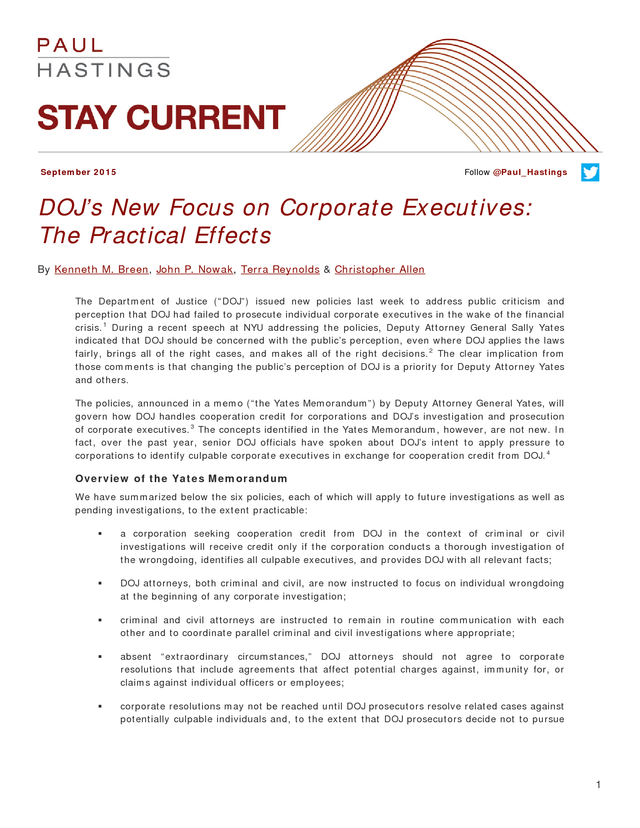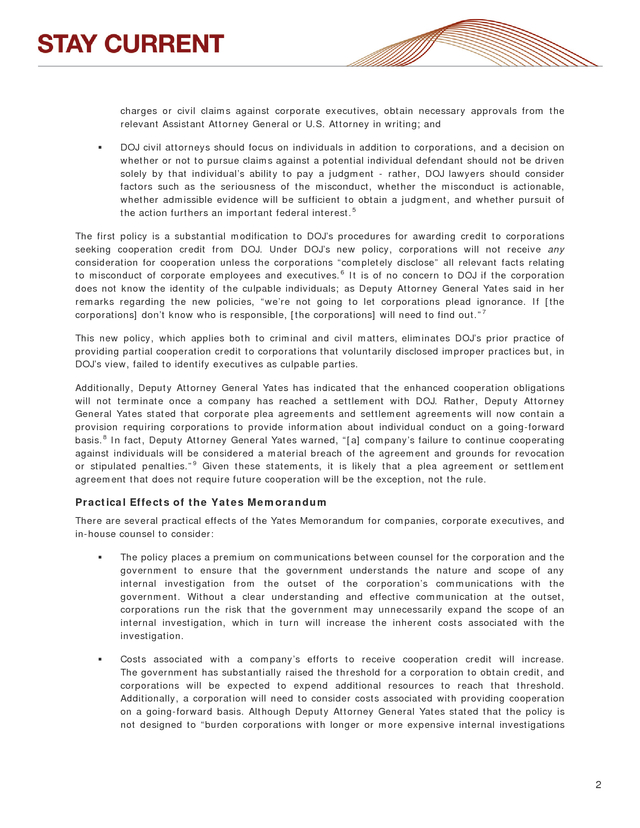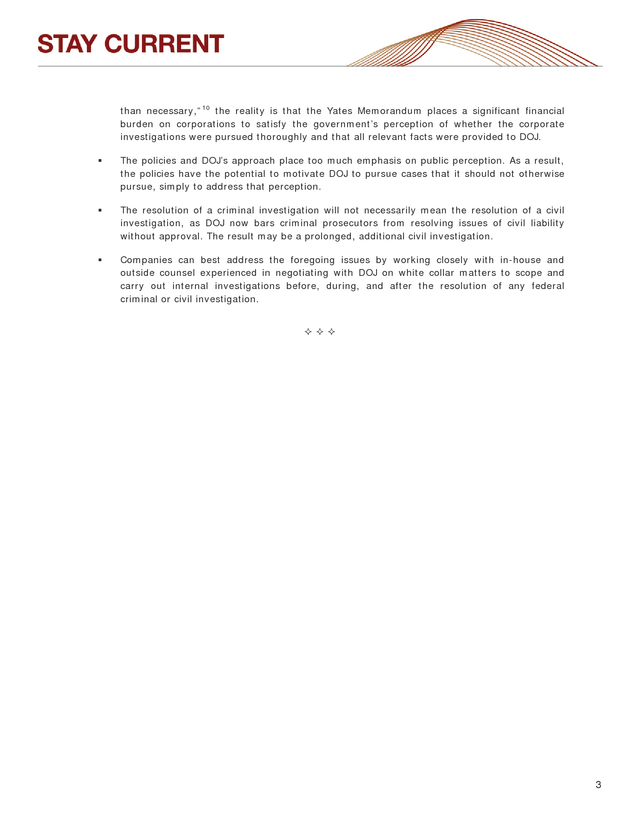Description
September 2015
Follow @Paul_Hastings
DOJ’s New Focus on Corporate Executives:
The Practical Effects
By Kenneth M. Breen, John P. Nowak, Terra Reynolds & Christopher Allen
The Department of Justice (“DOJ”) issued new policies last week to address public criticism and
perception that DOJ had failed to prosecute individual corporate executives in the wake of the financial
crisis. 1 During a recent speech at NYU addressing the policies, Deputy Attorney General Sally Yates
indicated that DOJ should be concerned with the public’s perception, even where DOJ applies the laws
fairly, brings all of the right cases, and makes all of the right decisions.
2 The clear implication from those comments is that changing the public’s perception of DOJ is a priority for Deputy Attorney Yates and others. The policies, announced in a memo (“the Yates Memorandum”) by Deputy Attorney General Yates, will govern how DOJ handles cooperation credit for corporations and DOJ’s investigation and prosecution of corporate executives. 3 The concepts identified in the Yates Memorandum, however, are not new. In fact, over the past year, senior DOJ officials have spoken about DOJ’s intent to apply pressure to corporations to identify culpable corporate executives in exchange for cooperation credit from DOJ.
4 Overview of the Yates Memorandum We have summarized below the six policies, each of which will apply to future investigations as well as pending investigations, to the extent practicable:  a corporation seeking cooperation credit from DOJ in the context of criminal or civil investigations will receive credit only if the corporation conducts a thorough investigation of the wrongdoing, identifies all culpable executives, and provides DOJ with all relevant facts;  DOJ attorneys, both criminal and civil, are now instructed to focus on individual wrongdoing at the beginning of any corporate investigation;  criminal and civil attorneys are instructed to remain in routine communication with each other and to coordinate parallel criminal and civil investigations where appropriate;  absent “extraordinary circumstances,” DOJ attorneys should not agree to corporate resolutions that include agreements that affect potential charges against, immunity for, or claims against individual officers or employees;  corporate resolutions may not be reached until DOJ prosecutors resolve related cases against potentially culpable individuals and, to the extent that DOJ prosecutors decide not to pursue 1 . charges or civil claims against corporate executives, obtain necessary approvals from the relevant Assistant Attorney General or U.S. Attorney in writing; and  DOJ civil attorneys should focus on individuals in addition to corporations, and a decision on whether or not to pursue claims against a potential individual defendant should not be driven solely by that individual’s ability to pay a judgment - rather, DOJ lawyers should consider factors such as the seriousness of the misconduct, whether the misconduct is actionable, whether admissible evidence will be sufficient to obtain a judgment, and whether pursuit of the action furthers an important federal interest. 5 The first policy is a substantial modification to DOJ’s procedures for awarding credit to corporations seeking cooperation credit from DOJ. Under DOJ’s new policy, corporations will not receive any consideration for cooperation unless the corporations “completely disclose” all relevant facts relating to misconduct of corporate employees and executives.
6 It is of no concern to DOJ if the corporation does not know the identity of the culpable individuals; as Deputy Attorney General Yates said in her remarks regarding the new policies, “we’re not going to let corporations plead ignorance. If [the corporations] don’t know who is responsible, [the corporations] will need to find out.” 7 This new policy, which applies both to criminal and civil matters, eliminates DOJ’s prior practice of providing partial cooperation credit to corporations that voluntarily disclosed improper practices but, in DOJ’s view, failed to identify executives as culpable parties. Additionally, Deputy Attorney General Yates has indicated that the enhanced cooperation obligations will not terminate once a company has reached a settlement with DOJ. Rather, Deputy Attorney General Yates stated that corporate plea agreements and settlement agreements will now contain a provision requiring corporations to provide information about individual conduct on a going-forward basis.
8 In fact, Deputy Attorney General Yates warned, “[a] company’s failure to continue cooperating against individuals will be considered a material breach of the agreement and grounds for revocation or stipulated penalties.” 9 Given these statements, it is likely that a plea agreement or settlement agreement that does not require future cooperation will be the exception, not the rule. Practical Effects of the Yates Memorandum There are several practical effects of the Yates Memorandum for companies, corporate executives, and in-house counsel to consider:  The policy places a premium on communications between counsel for the corporation and the government to ensure that the government understands the nature and scope of any internal investigation from the outset of the corporation’s communications with the government. Without a clear understanding and effective communication at the outset, corporations run the risk that the government may unnecessarily expand the scope of an internal investigation, which in turn will increase the inherent costs associated with the investigation.  Costs associated with a company’s efforts to receive cooperation credit will increase. The government has substantially raised the threshold for a corporation to obtain credit, and corporations will be expected to expend additional resources to reach that threshold. Additionally, a corporation will need to consider costs associated with providing cooperation on a going-forward basis. Although Deputy Attorney General Yates stated that the policy is not designed to “burden corporations with longer or more expensive internal investigations 2 .
than necessary,” 10 the reality is that the Yates Memorandum places a significant financial burden on corporations to satisfy the government’s perception of whether the corporate investigations were pursued thoroughly and that all relevant facts were provided to DOJ.  The policies and DOJ’s approach place too much emphasis on public perception. As a result, the policies have the potential to motivate DOJ to pursue cases that it should not otherwise pursue, simply to address that perception.  The resolution of a criminal investigation will not necessarily mean the resolution of a civil investigation, as DOJ now bars criminal prosecutors from resolving issues of civil liability without approval. The result may be a prolonged, additional civil investigation.  Companies can best address the foregoing issues by working closely with in-house and outside counsel experienced in negotiating with DOJ on white collar matters to scope and carry out internal investigations before, during, and after the resolution of any federal criminal or civil investigation.  3 . If you have any questions concerning these developing issues, please do not hesitate to contact any of the following Paul Hastings lawyers: Atlanta Paul N. Monnin 1.404.815.2138 paulmonnin@paulhastings.com Palmina Fava 1.212.318.6919 palminafava@paulhastings.com Scott M. Flicker 1.202.551.1726 scottflicker@paulhastings.com Chicago Gary F. Giampetruzzi 1.212.318.6417 garygiampetruzzi@paulhastings.com Tara K.
Giunta 1.202.551.1791 taragiunta@paulhastings.com John P. Nowak 1.212.318.6493 johnnowak@paulhastings.com Corinne A. Lammers 1.202.551.1846 corinnelammers@paulhastings.com Washington D.C. Michael N.
Levy 1.202.551.1983 michaellevy@paulhastings.com Mark D. Pollack 312.499.6050 markpollack@paulhastings.com Eric H. Sussman 1.312.499.6060 ericsussman@paulhastings.com Terra L.
Reynolds 1.312.499.6063 terrareynolds@paulhastings.com Amy K. Carpenter-Holmes 1.202.551.1977 amycarpenterholmes@paulhastings.com Los Angeles Thomas P. O’Brien 1.213.683.6146 thomasobrien@paulhastings.com Jay Darden 1.202.551.1961 jaydarden@paulhastings.com Daniel Prince 1.213.683.6169 danielprince@paulhastings.com Behnam Dayanim 1.202.551.1737 bdayanim@paulhastings.com New York Timothy L.
Dickinson 1.202.551.1858 timothydickinson@paulhastings.com Kenneth M. Breen 1.212.318.6344 kennethbreen@paulhastings.com Maria E. Douvas 1.212.318.6072 mariadouvas@paulhastings.com Nathaniel B.
Edmonds 1.202.551.1774 nathanieledmonds@paulhastings.com Robert D. Luskin 1.202.551.1966 robertluskin@paulhastings.com Kwame J. Manley 1.202.551.1962 kwamemanley@paulhastings.com Morgan J.
Miller 1.202.551.1861 morganmiller@paulhastings.com Michael L. Spafford 1.202.551.1988 michaelspafford@paulhastings.com 4 . 1 Yates Memorandum, Department of Justice, September 9, 2015, available at http://www.justice.gov/dag/file/769036/download. 2 “Acting Deputy Attorney General Sally Quillian Yates Delivers Remarks at New York University School of Law Announcing New Policy on Individual Liability in Matters of Corporate Wrongdoing,” September 10, 2015 (“Yates Announcement”), available at http://www.justice.gov/opa/speech/deputy-attorney-general-sally-quillian-yates-deliversremarks-new-york-university-school. 3 Yates Memorandum at 2. 4 For example, in September 2014, then-Attorney General Eric Holder explained the need to hold the “flesh-and-blood human beings” responsible for criminal conduct—not their corporate employers and innocent corporate shareholders. “Attorney General Holder Remarks on Financial Fraud Prosecutions at NYU School of Law,” September 17, 2014, available at http://www.justice.gov/opa/speech/attorney-general-holder-remarks-financial-fraud-prosecutions-nyuschool-law. 5 Yates Memorandum at 3-6. 6 Id. at 3. 7 Yates Announcement. 8 Yates Memorandum at 4. 9 Yates Announcement. 10 Id. Paul Hastings LLP Stay Current is published solely for the interests of friends and clients of Paul Hastings LLP and should in no way be relied upon or construed as legal advice. The views expressed in this publication reflect those of the authors and not necessarily the views of Paul Hastings. For specific information on recent developments or particular factual situations, the opinion of legal counsel should be sought.
These materials may be considered ATTORNEY ADVERTISING in some jurisdictions. Paul Hastings is a limited liability partnership. Copyright © 2015 Paul Hastings LLP. 5 .
2 The clear implication from those comments is that changing the public’s perception of DOJ is a priority for Deputy Attorney Yates and others. The policies, announced in a memo (“the Yates Memorandum”) by Deputy Attorney General Yates, will govern how DOJ handles cooperation credit for corporations and DOJ’s investigation and prosecution of corporate executives. 3 The concepts identified in the Yates Memorandum, however, are not new. In fact, over the past year, senior DOJ officials have spoken about DOJ’s intent to apply pressure to corporations to identify culpable corporate executives in exchange for cooperation credit from DOJ.
4 Overview of the Yates Memorandum We have summarized below the six policies, each of which will apply to future investigations as well as pending investigations, to the extent practicable:  a corporation seeking cooperation credit from DOJ in the context of criminal or civil investigations will receive credit only if the corporation conducts a thorough investigation of the wrongdoing, identifies all culpable executives, and provides DOJ with all relevant facts;  DOJ attorneys, both criminal and civil, are now instructed to focus on individual wrongdoing at the beginning of any corporate investigation;  criminal and civil attorneys are instructed to remain in routine communication with each other and to coordinate parallel criminal and civil investigations where appropriate;  absent “extraordinary circumstances,” DOJ attorneys should not agree to corporate resolutions that include agreements that affect potential charges against, immunity for, or claims against individual officers or employees;  corporate resolutions may not be reached until DOJ prosecutors resolve related cases against potentially culpable individuals and, to the extent that DOJ prosecutors decide not to pursue 1 . charges or civil claims against corporate executives, obtain necessary approvals from the relevant Assistant Attorney General or U.S. Attorney in writing; and  DOJ civil attorneys should focus on individuals in addition to corporations, and a decision on whether or not to pursue claims against a potential individual defendant should not be driven solely by that individual’s ability to pay a judgment - rather, DOJ lawyers should consider factors such as the seriousness of the misconduct, whether the misconduct is actionable, whether admissible evidence will be sufficient to obtain a judgment, and whether pursuit of the action furthers an important federal interest. 5 The first policy is a substantial modification to DOJ’s procedures for awarding credit to corporations seeking cooperation credit from DOJ. Under DOJ’s new policy, corporations will not receive any consideration for cooperation unless the corporations “completely disclose” all relevant facts relating to misconduct of corporate employees and executives.
6 It is of no concern to DOJ if the corporation does not know the identity of the culpable individuals; as Deputy Attorney General Yates said in her remarks regarding the new policies, “we’re not going to let corporations plead ignorance. If [the corporations] don’t know who is responsible, [the corporations] will need to find out.” 7 This new policy, which applies both to criminal and civil matters, eliminates DOJ’s prior practice of providing partial cooperation credit to corporations that voluntarily disclosed improper practices but, in DOJ’s view, failed to identify executives as culpable parties. Additionally, Deputy Attorney General Yates has indicated that the enhanced cooperation obligations will not terminate once a company has reached a settlement with DOJ. Rather, Deputy Attorney General Yates stated that corporate plea agreements and settlement agreements will now contain a provision requiring corporations to provide information about individual conduct on a going-forward basis.
8 In fact, Deputy Attorney General Yates warned, “[a] company’s failure to continue cooperating against individuals will be considered a material breach of the agreement and grounds for revocation or stipulated penalties.” 9 Given these statements, it is likely that a plea agreement or settlement agreement that does not require future cooperation will be the exception, not the rule. Practical Effects of the Yates Memorandum There are several practical effects of the Yates Memorandum for companies, corporate executives, and in-house counsel to consider:  The policy places a premium on communications between counsel for the corporation and the government to ensure that the government understands the nature and scope of any internal investigation from the outset of the corporation’s communications with the government. Without a clear understanding and effective communication at the outset, corporations run the risk that the government may unnecessarily expand the scope of an internal investigation, which in turn will increase the inherent costs associated with the investigation.  Costs associated with a company’s efforts to receive cooperation credit will increase. The government has substantially raised the threshold for a corporation to obtain credit, and corporations will be expected to expend additional resources to reach that threshold. Additionally, a corporation will need to consider costs associated with providing cooperation on a going-forward basis. Although Deputy Attorney General Yates stated that the policy is not designed to “burden corporations with longer or more expensive internal investigations 2 .
than necessary,” 10 the reality is that the Yates Memorandum places a significant financial burden on corporations to satisfy the government’s perception of whether the corporate investigations were pursued thoroughly and that all relevant facts were provided to DOJ.  The policies and DOJ’s approach place too much emphasis on public perception. As a result, the policies have the potential to motivate DOJ to pursue cases that it should not otherwise pursue, simply to address that perception.  The resolution of a criminal investigation will not necessarily mean the resolution of a civil investigation, as DOJ now bars criminal prosecutors from resolving issues of civil liability without approval. The result may be a prolonged, additional civil investigation.  Companies can best address the foregoing issues by working closely with in-house and outside counsel experienced in negotiating with DOJ on white collar matters to scope and carry out internal investigations before, during, and after the resolution of any federal criminal or civil investigation.  3 . If you have any questions concerning these developing issues, please do not hesitate to contact any of the following Paul Hastings lawyers: Atlanta Paul N. Monnin 1.404.815.2138 paulmonnin@paulhastings.com Palmina Fava 1.212.318.6919 palminafava@paulhastings.com Scott M. Flicker 1.202.551.1726 scottflicker@paulhastings.com Chicago Gary F. Giampetruzzi 1.212.318.6417 garygiampetruzzi@paulhastings.com Tara K.
Giunta 1.202.551.1791 taragiunta@paulhastings.com John P. Nowak 1.212.318.6493 johnnowak@paulhastings.com Corinne A. Lammers 1.202.551.1846 corinnelammers@paulhastings.com Washington D.C. Michael N.
Levy 1.202.551.1983 michaellevy@paulhastings.com Mark D. Pollack 312.499.6050 markpollack@paulhastings.com Eric H. Sussman 1.312.499.6060 ericsussman@paulhastings.com Terra L.
Reynolds 1.312.499.6063 terrareynolds@paulhastings.com Amy K. Carpenter-Holmes 1.202.551.1977 amycarpenterholmes@paulhastings.com Los Angeles Thomas P. O’Brien 1.213.683.6146 thomasobrien@paulhastings.com Jay Darden 1.202.551.1961 jaydarden@paulhastings.com Daniel Prince 1.213.683.6169 danielprince@paulhastings.com Behnam Dayanim 1.202.551.1737 bdayanim@paulhastings.com New York Timothy L.
Dickinson 1.202.551.1858 timothydickinson@paulhastings.com Kenneth M. Breen 1.212.318.6344 kennethbreen@paulhastings.com Maria E. Douvas 1.212.318.6072 mariadouvas@paulhastings.com Nathaniel B.
Edmonds 1.202.551.1774 nathanieledmonds@paulhastings.com Robert D. Luskin 1.202.551.1966 robertluskin@paulhastings.com Kwame J. Manley 1.202.551.1962 kwamemanley@paulhastings.com Morgan J.
Miller 1.202.551.1861 morganmiller@paulhastings.com Michael L. Spafford 1.202.551.1988 michaelspafford@paulhastings.com 4 . 1 Yates Memorandum, Department of Justice, September 9, 2015, available at http://www.justice.gov/dag/file/769036/download. 2 “Acting Deputy Attorney General Sally Quillian Yates Delivers Remarks at New York University School of Law Announcing New Policy on Individual Liability in Matters of Corporate Wrongdoing,” September 10, 2015 (“Yates Announcement”), available at http://www.justice.gov/opa/speech/deputy-attorney-general-sally-quillian-yates-deliversremarks-new-york-university-school. 3 Yates Memorandum at 2. 4 For example, in September 2014, then-Attorney General Eric Holder explained the need to hold the “flesh-and-blood human beings” responsible for criminal conduct—not their corporate employers and innocent corporate shareholders. “Attorney General Holder Remarks on Financial Fraud Prosecutions at NYU School of Law,” September 17, 2014, available at http://www.justice.gov/opa/speech/attorney-general-holder-remarks-financial-fraud-prosecutions-nyuschool-law. 5 Yates Memorandum at 3-6. 6 Id. at 3. 7 Yates Announcement. 8 Yates Memorandum at 4. 9 Yates Announcement. 10 Id. Paul Hastings LLP Stay Current is published solely for the interests of friends and clients of Paul Hastings LLP and should in no way be relied upon or construed as legal advice. The views expressed in this publication reflect those of the authors and not necessarily the views of Paul Hastings. For specific information on recent developments or particular factual situations, the opinion of legal counsel should be sought.
These materials may be considered ATTORNEY ADVERTISING in some jurisdictions. Paul Hastings is a limited liability partnership. Copyright © 2015 Paul Hastings LLP. 5 .



















